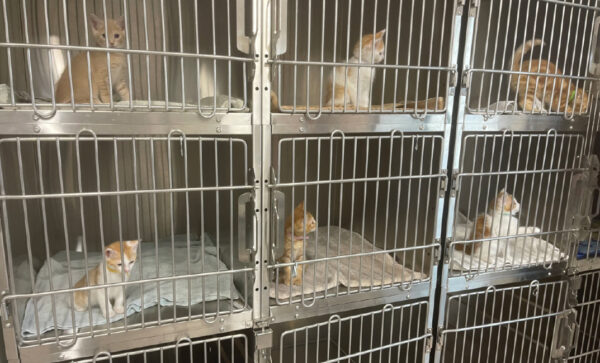By Georgie Preston
Like many Sunshine residents, Daniel Kruk acquired his newest pet through what’s known as the ‘universal cat distribution system’. In other words, it was a stray.
Where he lives there are many stray cats. One neighbour regularly sets out leftover food on her front porch to feed the masses, attracting dozens.
When his family decided to keep their new cat, they searched for local desexing services and found Westside Desexing Clinic. Its motto ‘Desex the West,’ won over Mr Kruk and he happily paid their full fee, receiving what he said was a “fantastic” service at a very busy clinic.
But a few days later the clinic announced its closure. The loss of the affordable service which made desexing pets a reality for so many prompted an outcry on social media.
Westside Desexing Clinic co-founder Dr Penny Hocking says since the closure she receives calls every day from people, many asking why such a beloved local service shut its doors after just three years.
Dr Hocking and co-founder Dr Ann Enright started the clinic back in 2021 with a goal of addressing the cat crisis in the western suburbs.
At the time, they were seeing thousands of unwanted cats overburden rescue groups. Many healthy cats and kittens were being euthanised causing distress and even prompting many vets to leave the industry.
“Science shows that the best way to reduce the number of cats is providing low-cost desexing programmes,” she says. “Our initiative was to provide affordable desexing to our low-income communities.”
Together with the State Government, local councils and rescue shelters, the pair targeted low socio-economic hotspots where the number of strays were generally higher.
Over the past three years the clinic microchipped and desexed 6,428 cats, which prevented the birth of an estimated 30,000 kittens.
Dr Hocking says the key to that success is affordability. “We found that […] as soon as the price went over $100, less people came.”
However, despite the clinic being fully booked lower fees meant it wasn’t sustainable to pay staff.
“Because people know we’ve received grants, they don’t quite understand why we’re shutting,” she says.
“However, the grants have only ever been able to be spent on building facilities or equipment, and not on wages.”

For this, the clinic had to rely on external funding from rescue groups and local councils. But, as Dr Hocking says, rescue groups need to prioritise spending their money looking after the cats.
The state government recently released $300,000 worth of grants for cat desexing programs which councils can apply for.
Dr Hocking says while the programs are helpful they’re “a drop in the ocean” compared to the $60 million allocated to the War on Cats; a program which targets feral cats by spraying them with a toxic gel, amongst other methods.
The grant application process also requires a huge amount of work.
“You can put in two weeks of work for a grant, and you might not get it…you can’t run a business on grants that may or may not be there.”
Dr Hocking says Westies can help curb the stray cat crisis by supporting others to desex their cats.
“If [you]’ve got a neighbour who can’t drive, offer them a lift to get their cats desexed.”
However, she says the most important thing people can do is ask their local councillors and MPs to provide low-cost desexing programs.
“Considering the scale of the cat problem, fixing it needs to be considered a public good, so therefore it needs to be funded.”
She says local councils are aware of the issue and spend a significant amount of money picking up strays, but their resources are limited. She believes councils will get involved if they receive more funding from the State Government.
“I think our closure has just shown how short sighted our current decision makers are in animal welfare,” she said.
Wyndham, Hobsons Bay, Brimbank and Maribyrnong Councils were contacted for comment but were all in caretaker mode and unable to comment due to the recent local government elections.


Such a shame. This was a great community and animal welfare asset. Maribyrnong council did not come to the party and offer discounts for their residents, unlike Hobsons Bay, Wyndham and Brimbank councils.
I don’t understand why they closed their doors! It was constantly busy, they were getting plenty of customers and volunteers! It was very successful!! It’s a shame after the $ spent on this place! What a waste!!